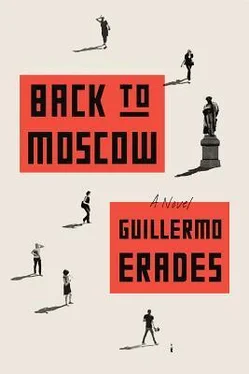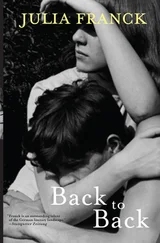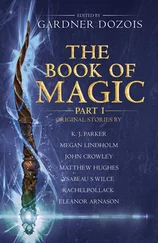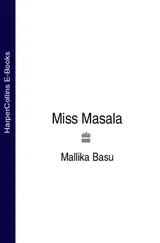At night, before falling asleep, we would lie reading on the couch. She was always nose-deep in some spiritual book or self-help manual, Lena, about the power of meditation or compassion or friendship, and every time she encountered a new concept — an insight she found revealing — she would read it aloud to me, hoping that I’d embrace it at once as she had, and she would get pissed off when I teased her and didn’t take her books seriously. It seemed to me that most of Lena’s books talked about the same crap — about refusing temptation and attachment and material pleasure, about how we all needed to focus instead on the spiritual world around us.
We also listened to music.
One afternoon, in early August, Lena and I were lying naked on my couch, listening to an album I had recently bought at the Gorbushka pirate CD market. The sun was setting over Moscow. Orange sunlight poured into my living room, over the coffee table, the couch, the wall tapestry. Bathed in the evening sun, Lord Ganesh almost came alive. It felt good to be there with Lena, calm and quiet.
The balcony doors were open. In between songs, I could hear the permanent roar of the city, mixed with the chattering of people and the clinking of glasses that came from the Scandinavia terrace, but also, at some point, the distant sound of sirens.
I was enjoying the album, a pirate compilation from an indie rock band I’d recently discovered. I couldn’t keep my eyes off Ganesh, his elephant head and twisted arms looking mystical under the warm sun-rays. It was in these moments of serene nudity that all my senses were at their most receptive.
‘I love this album,’ I said.
‘Very nice songs.’ Lena had her head on my chest and one leg between my legs.
‘You know what,’ I said, ‘I’m going to give you this CD. You can have it.’
‘Why?’
‘A present.’
‘What for?’
‘You just said you like it.’
‘I do. But it’s your CD.’
‘This is a pirate copy,’ I said. ‘I bought it in Gorbushka. But I really like it so I’ll buy the licensed CD in the official shop.’
‘Why would you buy a licensed copy of a CD you already have?’ she said. ‘Licensed CDs are very expensive.’
‘I know, but it feels different. When I really like an album, I prefer to have the original thing.’
For a few seconds we remained silent, listening to the music. Abruptly, Lena untangled herself from my body and rolled away from me, facing now the back of the couch. Her blonde hair, cut short at her neck, shone brighter in the sun.
I could hear more sirens howling in the street, louder now, closer — an unsettling sound, but, back then, a sound unrelated to my own pain.
‘Strange about those sirens,’ I said.
Lena didn’t answer. She was covering her eyes with an arm.
Lena was crying.
‘What’s wrong?’ I asked.
‘Nothing.’
‘What have I done?’
‘Nothing. It’s OK.’
‘It’s not OK, you’re crying.’
‘It’s nothing.’
‘Is it something I said?’
Lena got up, stomped to the other side of the room. She took a tissue from her handbag, blew her nose, came back and sat on the other side of the couch, staring at the sunset. She was still naked, but now out of my reach; biting the golden cross on her chain.
‘Maybe something bad happened in the street,’ she said. ‘An accident.’
‘Lenushka, tell me, what’s wrong?’
‘I don’t know,’ she said. ‘I guess I’m just stupid.’
‘Is it about the CD?’
Silence.
‘What is it?’ I said.
‘Yes, Martin, it’s about the CD.’
For a few seconds I tried to understand the situation. Then I moved along the couch and held Lena’s hand.
‘Lenushka,’ I said, ‘I don’t know what I was thinking. I’m not going to give you a pirate copy. I’ll buy two copies of the original CD, one for me and one for you.’
Gazing out through the balcony, Lena shook her head slowly, in silence. Then she turned to me.
‘Martin, I don’t want your fucking compact disc.’
‘Lenushka, what’s wrong?’
‘Why the hell would I need a CD that you have?’
She stood up. The rays of setting sun illuminated her beautiful breasts and sparkled on the golden cross than hung above them.
‘Has it crossed your mind,’ she said, failing to hold back her tears, ‘that maybe one day we could move in together, you and me, as a real couple, and then we would not need two copies of the same album?’
The next day I learned about the sirens. A bomb had gone off at the perekhod in Pushkinskaya, about two hundred metres away from my building, killing thirteen people and injuring more than a hundred. The news on TV showed images of broken glass, people screaming, a pool of blood. It seemed the blast, which I hadn’t heard, had occurred at the southern entry of the perekhod. The police said it was the work of Chechen terrorists.
It felt unreal to see the mayhem on TV when all the action had been taking place only a minute away from my building. The bomb had exploded in the very heart of Moscow, a few steps from Pushkin’s statue, on the route I took almost daily, the route Lena had probably followed, before the explosion, to get to my place. I wondered if, at the time of the bombing, people on the Scandinavia terrace had noticed what was going on on the other side of the building, while they were drinking beer and gorging on the best burgers in town.
For a few days I avoided the underpasses at Pushkinskaya. I would cross at street level, using the zebra crossing on the Boulevard. The first time I went back to walking through the perekhod, I saw a plaque on the wall commemorating the victims and, from that day on — and for the rest of my stay in Moscow — every time I passed by there would be flowers and candles on the ground under the plaque, and I would be forced to remember the day I failed to hear the deadly explosion from my flat — the day thirteen people were killed in Pushkinskaya and Lena thought we didn’t need two copies of the same CD because maybe we could move in together.
And yet, other than the plaque and the flowers and candles, everything in Pushkinskaya looked exactly as it had before the explosion. Muscovites rushed in and out of the metro, stopping at the kiosks to buy knock-off watches, sunglasses and chocolates. Up at ground level, young couples met beneath Pushkin’s statue, exchanging flowers and kisses, as they had done before the explosion, and as they would keep doing, I imagined, for many years to come.
ON 12 AUGUST, LESS than a week after the bomb in Pushkinskaya, a Russian nuclear submarine sank in the North Sea with its entire crew on board.
I only learned about this the day after, while I was watching the news on TV. It was early in the morning and, despite the bright light coming in from the balcony, I was yet to reach a state of complete wakefulness. I lay stretched on the couch, in my underpants, drinking coffee. As far as I understood from the news, the submarine was now lying at the bottom of the sea, the survivors trapped inside the hull. The Russian president, who had decided not to interrupt his holidays by the Black Sea, had ordered the deployment of a rescue team.
I finished my coffee, turned off the TV. After a cold shower, I put on a pair of jeans and a white T-shirt and took the stairs down to the street. I had agreed to meet Stepanov for breakfast at the Starlite.
It was a lovely summer morning. The sky was clear, the air fresh. As I walked towards Mayakovskaya, I found myself thinking about the Russian sailors who, at that very moment, were trapped underwater, with little oxygen, probably in darkness. When I reached the Akvarium Garden I found it prettier than ever. It was all green and full of life — a smattering of red tulip-like flowers had sprouted around the Apollo fountain at the back of the park.
Читать дальше












